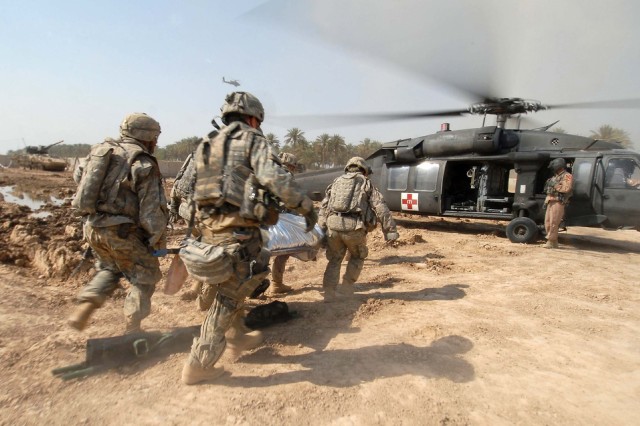 |
Marines pressed up against a wall as a helicopter arrived
to pick up wounded troops during fighting in Afghanistan
in 2010. Tyler Hicks/NYT
|
As the Pentagon prepared to send tens of thousands of additional American forces to Afghanistan in 2009, Defense Secretary Robert M. Gates became concerned that the rugged terrain and vast distances of the war zone were keeping wounded troops from reaching hospital care within 60 minutes. This is the so-called golden hour, which combat medical experts deem vital to survival.
Despite protests from the military, Mr. Gates ordered more helicopters to Afghanistan to evacuate troops wounded by gunfire, grenades and roadside bombs. He directed that helicopters previously set aside for rescuing downed pilots be reassigned to medical evacuation, because not a single fighter jet or bomber had been shot down in the war. Mr. Gates also increased the number of field hospitals.
The initiatives appear to have succeeded. A peer-reviewed medical study published online on Wednesday reports that the secretary’s orders saved an estimated 359 lives from June 2009 to March 2014, with important lessons today for the military and the Pentagon bureaucracy.
“A 2009 mandate by Secretary of Defense Gates reduced the time between critical injury and definitive care for combat casualties in Afghanistan,” said the study, published by the journal JAMA Surgery. “Despite evidence of increased severity and complexity of wounds from explosive devices, the combination of reduced prehospital transport time and increased treatment capability are likely contributors of casualty survival.”
Mr. Gates said he was gratified to learn that his decision to reduce medical evacuation times and improve trauma care in Afghanistan was credited with saving hundreds of lives. He also noted the importance of a secretary-level order to compel a reluctant Pentagon bureaucracy to focus on the needs of the troops.
“Those opposed to the decision, and there were many, argued that in terms of saving lives, the added capabilities would have marginal impact statistically,” said Mr. Gates, who left his post in 2011. “I had no data to support my decision. I simply told them my decision was a matter of morale and moral obligation to the troops. If I were a soldier who had just been blown up, I’d want a helicopter there as fast as possible.”Read the rest of the story HERE.
If you like what you see, please "Like" us on Facebook either here or here. Please follow us on Twitter here.





No comments:
Post a Comment